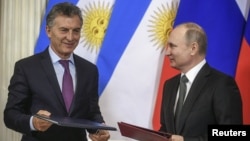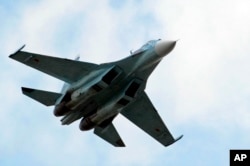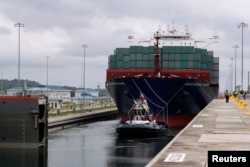Russia and China are making steady progress in reshaping the current international order, worrying the United States and its regional allies.
Concerns that Moscow and Beijing are actively trying to reshape the balance of power are not new and have been a focus of the new U.S. national security and defense strategies.
But while top military officials have repeatedly sounded the alarm about Russian and Chinese activities in other parts of the world, from Europe to Asia to Africa, there is a sense that not enough attention has been paid to what both countries have been able to do in South and Central America.
"We can't just pay attention to what they're doing in Europe or in the South China Sea," warned Admiral Kurt Tidd, the commander of U.S. Southern Command.
"Right here, far closer to home, there is competition going on," Tidd told reporters Thursday in Washington. "It's competition for influence and the single-most important thing we can do is compete ourselves."
Russia, in particular, has been increasingly aggressive in re-establishing a military presence, sending ships to the region to make port calls while also boosting its intelligence-gathering platforms and operations, according to officials.
Defense ties
Moscow has also worked to repair or cement defense ties with former allies in the region, selling them advanced weaponry like military jets and air defense systems.
"The country that has benefited most from Russian military sales has been Venezuela, a significant number of high-tech systems that clearly are not warranted from the security threats in the area," Tidd said.
U.S. Southern Command points to Nicaragua as another beneficiary of the Russian military push, saying the country recently took delivery of refurbished tanks.
Other countries looking to modernize or upgrade their military capabilities are also being targeted, often being lured with lower prices.
In January, during a visit by Argentinian President Mauricio Macri to Moscow, the counties signed a memorandum of understanding to boost uranium production in Argentina, and Russian President Vladimir Putin offered to sell Macri rocket engines.
Russia has also been exploring deals with Brazil, which bought Russian-made MANPADS [man-portable air defense systems] last year and has expressed interest in Russia's Pantsir surface-to-air missile system.
Yet U.S. officials also accuse Russia of using information campaigns to gain an advantage, in one case scuttling a possible sale of U.S. armored vehicles to Peru.
"Some, I think, very unhelpful propaganda came out of Russia talking about undercutting and underselling the ability of the [U.S.-made] Stryker to do its job," Tidd said. "And then they roll in with some refurbished BTR's [armored personnel carriers] at a cut-rate price."
But some analysts think the concern may be overstated.
"Two, three years ago you saw that sort of propaganda," Stratfor Latin America Analyst Paulo Gregoire told VOA. "You do not see that sort of propaganda lately."
Lack money for military
A big reason, Gregoire said, is that countries across Latin America do not have the money to spend on military hardware like they did even a few years ago.
That is not to say that Russia does not have other advantages.
"Governments in Latin America like to deal with other governments directly and get things done government-to-government," Gregoire said, something they can do more easily with Russia and China.
"With the U.S., you talk to the government but actually have to talk to [defense] companies," he said, adding there are persistent concerns that any arms deal could be blocked by the U.S. Congress.
China's inroads in South and Central America, while equally worrisome to U.S. officials, have focused less on military sales and more on economic development.
One country of particular concern is Panama.
China is already the world's second-largest user of the Panama Canal, according to Panamanian officials, and the two countries are set to begin a new round of trade negotiations next month.
While U.S. military officials are not yet worried Beijing's efforts will have any immediate impact on the ability of the U.S. to move military vessels and materiel through the region, they are wary given China's ability to move quickly from economic ventures to military ones.
"I'm thinking of Djibouti," U.S. Southern Command's Tidd told reporters Thursday, referencing China's first foreign military base in Africa. "How quickly they've ramped that up and established a fairly major presence."



